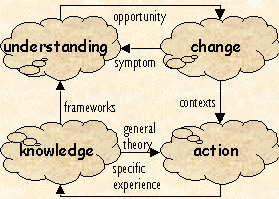 |
zone theory
interaction between different styles of activity
|
| on this page |
|
| elsewhere |
|
 |
|
|
| We identify four zones: Modelling,
Learning, Planning and Implementation. These zones may be combined synchronically
or diachronically.
Each zone has its own characteristic discourse: Understanding,
Knowledge, Action and Change. |
|

Intervention to enhance capability demands activity across four zones.
Each zone is characterized by a different discourse, a specific
process of argument (or dialectic) having a particular perspective and
goal.
 |
The discourse of understanding is an analytical one, concerned
with gaining systematic insight. It is also a catalytical one, concerned
with stimulating the recognition of opportunities. This discourse is commonly
associated with the consultant's mode of operation, talking about the underlying
causes and structures, and building conceptual models. |
 |
The discourse of action is about decisive exploitation of knowledge
in a specific context. This discourse is commonly associated with the behaviour
of managers as agents, talking about the solutions, designing and
planning actions for their construction and implementation. Debates
between management and trades unions are commonly held within the discourse
of action, with labour representatives using the language of management
to discuss management decisions. (Of course, these debates are often conflictual,
but even conflict requires a common language.) |
 |
The discourse of change is about 'symptoms', and their 'treatment',
'relief' or 'cure'. This discourse belongs to the organization itself,
talking about a (presenting) problem or opportunity that requires attention
or change.. (In many organizations it is a discourse of resistance
- the cultural or technological legacies that serve to resist and frustrate
any action.) This is what 'speaks' to the consultant. |
 |
The discourse of knowledge is about knowledge-as-product, which
should be generalized or generalizable. That which can be illustrated or
theorized in academic papers, contained in text books, taught to students,
or even tested in examinations. This discourse belongs in part to business
schools and universities, but is also partly contained within any 'learning
organization', talking about the general scientific or practical lessons
that can be extracted from the other three discourses (by induction), and
then fed back in (by deduction). |
These four discourses also correspond to a set of stereotypes: the superintelligent
but passive consultant who appears in many anti-consultant jokes, the 'strong'
manager who believes only in action and despises reflection, the organization
that frustrates or counteracts any positive intervention, the business
school that teaches simplistic frameworks and generalized slogans.
Descriptions of the four-discourse structure often (or, as some would
argue, always) tend to privilege one of the four discourses. For example,
discussing this under the heading of 'Organizational Change' privileges
the CHANGE discourse.

In the previous section, the four discourses were described in positive
terms. Understanding, action, change and knowledge - these are all Good
Things. We should remember that each of these discourses contains its opposite:
-
The Discourse of Misunderstanding
-
The Discourse of Inaction and Excuses
-
The Discourse of Resistance and Inertia
-
The Discourse of Not-Learning and Ignorance
In many organizations, these negative forms of the discourses will be more
familar than the positive forms.
We are implying an ethic in which the positive discourses are better
than the negative ones: thus understanding is better than misunderstanding,
and so on. We are also implying an epistemology in which the positive discourses
can be distinguished objectively from the negative ones: thus change is
objectively different to inertia. Who would question these two implications?

The four zones identified on this page can be mapped onto Kolb’s four-part
model of experiential learning, in which he identifies four practical (management)
competencies relevant to four modes of experience (learning styles). Kolb’s
work is widely referenced in the field of management development and training.
|
Zone
|
Implementation |
Learning |
Modelling |
Planning |
|
Discourse
|
Change |
Knowledge |
Understanding |
Action |
|
Locus of Specialization
|
The organization itself |
The business school |
The consultant |
The manager |
|
Mode of Experience (Learning Style)
|
Concrete |
Reflective |
Abstract conceptualization |
Active experimentation |
|
Competence (Kolb)
|
Affective (e.g. being sensitive to people’s feelings) |
Perceptual (e.g. gathering information) |
Symbolic (e.g. building conceptual models) |
Behavioural (e.g. making decisions) |

Various issues gravitate towards particular zones. Or contrariwise,
the discourse in each zone problematizes certain issues:
|
project zone |
discourse |
issues |
 |
Implementation Zone |
Change |
ecological issues: problem, stakeholder, benefit, cost, risk, ... |
 |
Learning Zone |
Knowledge |
epistemological issues: progress, paradigm, commodity fetish, ownership,
... |
 |
Planning Zone |
Action |
ethical issues: authority, responsibility, agency, ... |
 |
Modelling Zone |
Understanding |
practical issues: perspective, purpose, reflexivity, ... |


| top
home page
contact us |
 |
| |
This page last updated on June 16th, 2003
Copyright © 2002-3 Veryard Projects Ltd
http://www.veryard.com/demcha/zones.htm
|







![]()
